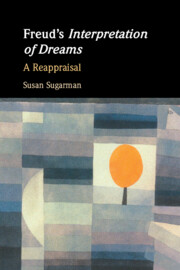Book contents
- Freud’s Interpretation of Dreams
- Freud’s Interpretation of Dreams
- Copyright page
- Dedication
- Contents
- Acknowledgments
- Introduction
- Part I The Interpretation of Dreams (1900)
- A Note on Freud’s Text
- 1 The Interpretation of Dreams (1900), Chapters I–IV
- 2 The Interpretation of Dreams (1900), Chapters V and VI
- 3 The Interpretation of Dreams (1900), Chapter VII
- 4 The Interpretation of Dreams (1900)
- Part II Freud’s Other Works
- Conclusion
- References
- Index
3 - The Interpretation of Dreams (1900), Chapter VII
The Psychology of the Dream Processes
from Part I - The Interpretation of Dreams (1900)
Published online by Cambridge University Press: 18 November 2022
- Freud’s Interpretation of Dreams
- Freud’s Interpretation of Dreams
- Copyright page
- Dedication
- Contents
- Acknowledgments
- Introduction
- Part I The Interpretation of Dreams (1900)
- A Note on Freud’s Text
- 1 The Interpretation of Dreams (1900), Chapters I–IV
- 2 The Interpretation of Dreams (1900), Chapters V and VI
- 3 The Interpretation of Dreams (1900), Chapter VII
- 4 The Interpretation of Dreams (1900)
- Part II Freud’s Other Works
- Conclusion
- References
- Index
Summary
In his final chapter, Freud tries to show that his dreams theory follows from larger principles about the way our minds work.
Wish-fulfillment, he argues, is a very old function, embodied, even, by the nervous system, which operates to discharge excitation. Dreaming, as psychically primitive, realizes that function, and only that function. It is set in motion by a wish that, if unattended, would wake us. A dream, fulfilling such a wish, allows us to sleep on. It hallucinates the fulfillment, hallucination of the mental equivalent of a reflex, serving the purpose of discharging an irritant.
Keywords
- Type
- Chapter
- Information
- Freud’s Interpretation of DreamsA Reappraisal, pp. 61 - 79Publisher: Cambridge University PressPrint publication year: 2022

